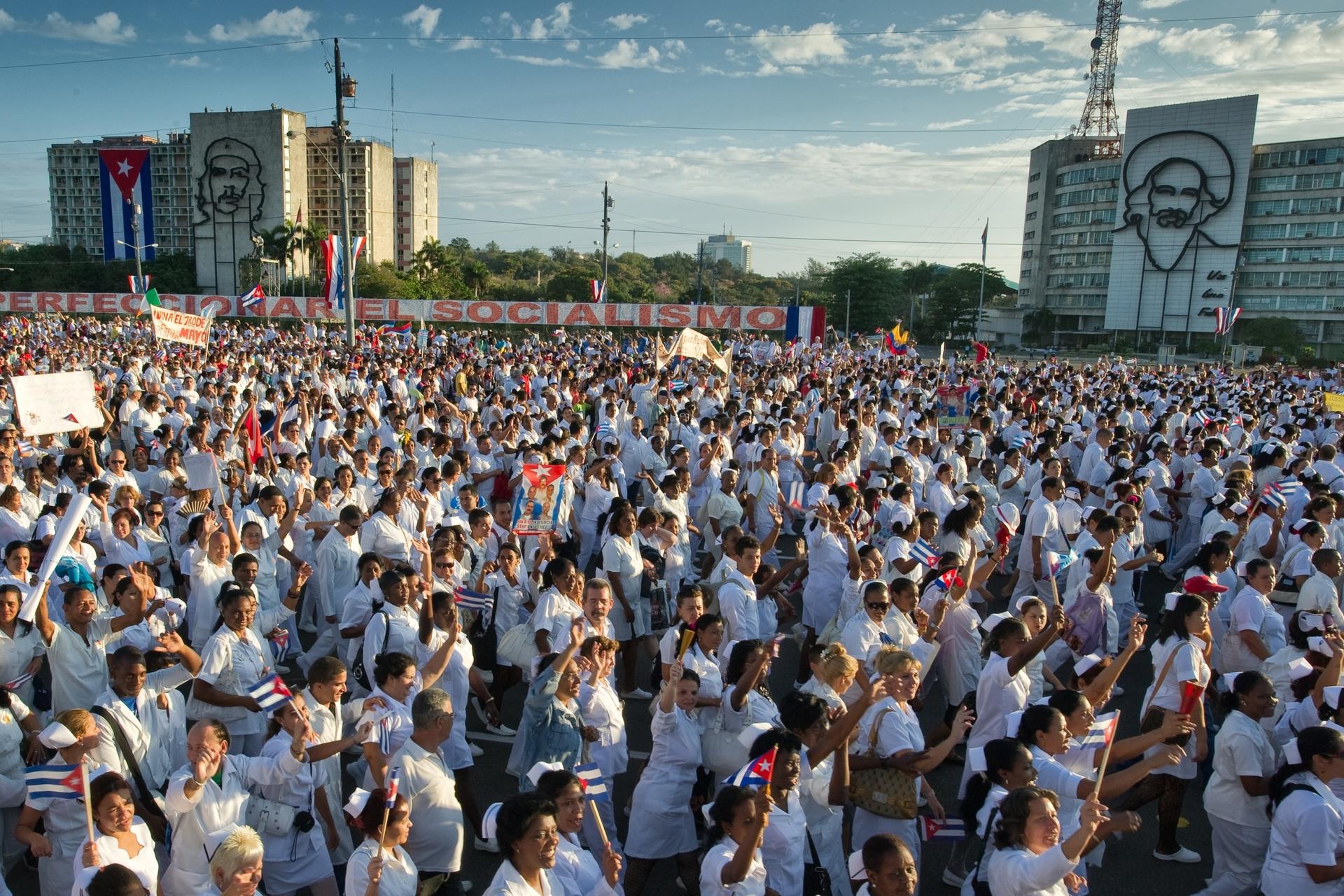Cuba without Chavez
A sea of Cubans march under the slogan “Preserve and Perfect Socialism” in Havana on May 1 to mark Labor Day.
HAVANA, Cuba — Ask Cubans what the worst years of the so-called “Special Period” were like, right after the Soviet Union’s demise dumped the island’s economy in a ditch, and you’re likely to hear a recitation of the era’s most notorious menu options.
Sautéed rags. Burgers made from grapefruit rinds. Cat-meat stew.
Apocryphal or not, the stories of Cuban desperation are so much a part of popular lore that they now serve as shorthand for Cuba’s lowest point, in the early 1990s, a time of acute hardship the island has been trying to recover from ever since.
Now, with Hugo Chavez and his Cuban oncologists locked in a mortal battle with an undisclosed form of cancer — and the Venezuelan president facing uncertain re-election in October — Cubans are wondering if hard times are coming back. If so, how hard will they be?
The Venezuelan leader supplies the island with about two-thirds of its oil on favorable credit terms, a mysterious arrangement whose details remain a state secret here. Chavez also pays the Castro government more than $6 billion a year for the 40,000 or so Cuban doctors, nurses, security advisers and other professionals sent on “missions” to Venezuela, typically to provide social services in the poor neighborhoods where support for Chavez is the strongest.
These missionaries are Cuba’s biggest source of hard currency, bringing in far more revenue for the island than tourism, nickel exports or other industries.
More from GlobalPost: 'KSM' gets his day in Guantanamo court
That arrangement looks increasingly shaky with Chavez now in a Havana hospital, undergoing another round of radiation therapy but assuring the public he’s in the “home stretch” of his treatment schedule. It’s not much comfort, given that he has yet to disclose what type of cancer he’s fighting.
Instead, the world has seen a worried-looking Chavez praying for Jesus to spare his life — a scary sight for many here.
If Chavez beats the cancer with the help of his Cuban doctors and his nurturing mentor, Cuba’s former President Fidel Castro, the Venezuelan leader’s bond with the island will likely be stronger than ever. A vigorous recovery would give a huge boost to his re-election bid, converting his larger-than-life heroic image into a death-defying one.
If Chavez’s cancer is terminal but he lives long enough to win re-election, a hand-picked vice president could take over and keep Venezuela’s trade agreements with Cuba in place, since that figure would likely need Havana’s help to maintain support among Venezuela’s poor.
But if Chavez can’t win or can’t survive, and his campaign rival Henrique Capriles wins the presidency, Cuba’s generous subsidies could be a fat target for his red pen.
Experts say a split between the two countries wouldn’t necessarily happen immediately, playing out more as a gradual untangling than an abrupt break. Pulling thousands of doctors and other Cuban social workers out of Venezuela’s toughest neighborhoods too fast might be tricky, unleashing a wave of anger and unrest.
More from GlobalPost: Cuba policy costs Obama at Americas summit
Still, few believe a post-Chavez trade balance would stay sweet for Cuba very long.
University of Havana economist Pavel Vidal said the island would likely face a recession lasting “one, two, even three years” if Venezuelan subsidies dry up, with an economic contraction projected at 9 percent of Cuba’s gross domestic product (GDP).
The Soviet collapse in 1991, by contrast, produced a 35 percent economic contraction, he said, but warned that the island’s economy is in some ways more fragile now.
“Cuba doesn’t have the same kind of economic cushion it had back then,” said Vidal, noting that the island has been facing acute cash shortages, with little ability to borrow money.
“There isn’t as much of a margin to work with,” he said, “which is why it’s even more important to accelerate economic liberalization and reforms.”
There are signs that Chavez’s illness has created new urgency for Cuban President Raul Castro to move faster on his economic reform agenda. Last month a top Cuban Communist Party official said that while nearly 95 percent of the island’s economic output is generated by state-owned businesses today, that figure will drop closer to 50 percent in the next four or five years, as millions of government workers shift to private sector and other “non-state” jobs.
Given that Cuba still restricts small business and self-employment licenses to micro-enterprises like snack bars, room rentals and barber shops, there is potentially a good deal of room to grow. But the government would have to allow Cubans to own medium-sized businesses and accelerate the conversion of money-losing state companies into worker-run cooperatives.
More from GlobalPost: The Argentine economy’s fuzzy math problem
At this week’s May Day rally in Havana, employees from several privately owned businesses marched alongside state workers, some carrying large banners which conveniently doubled as free advertising.
One restaurant owner and his 21 employees marched in their red company shirts, handing out business cards.
Another Havana entrepreneur, Lazaro Enciso, said he sees his capitalism as a patriotic calling. “I’m creating jobs, and that makes me feel useful to society,” said Enciso, who runs three businesses — a snack bar, a clothing shop, and a stand selling religious items — for which he’s hired about 20 workers.
“We’re providing our country with exactly what it needs right now,” he said.
We want to hear your feedback so we can keep improving our website, theworld.org. Please fill out this quick survey and let us know your thoughts (your answers will be anonymous). Thanks for your time!
